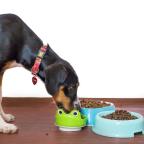
Back-to-school separation anxiety in dogs
With the kids back in school and the Summer Holidays out of sight, for many of us, September doesn't just bring a change in the weather.
Now the nights are drawing in, your pets, particularly your pooches, can become sensitive to changes to their routine as well as their environment.
PDSA Vet Nurse, Nina Downing said:
"We've all experienced the 'holiday blues and our dogs are no different. They've got used to spending more time with you, getting extra fuss and attention, and can be left feeling bored and lonely when everyone else suddenly goes back to their normal routine, leaving them feeling out of sorts.
"Just like us humans, dogs are very social animals. They don't like to be alone and need plenty of human companionship."
So, if you have questions on dog separation anxiety such as, how long you're able to leave your dog alone? Or, if there are ways to prevent restless behaviour, rest assured, we have you covered.
What is separation anxiety in dogs, and should I be worried?
"Separation anxiety is when a dog feels anxious when they're alone, or away from family members who they are most bonded to.
"These days, vets often use the broader term 'separation-related behaviours' because not all dogs that struggle being alone feel anxious, some feel scared, panicked, frustrated, bored, or even over-excited.
"Separation-related problems are extremely common in dogs, varying in their extremes, and they can have a big impact on the dog and their owner's quality of life.
"However, it's often possible to improve a separation-related problem with behavioural therapy, training, changes at home, and sometimes pet-friendly medication if your vet recommends it as appropriate.
Separation anxiety symptoms to be aware of
"Separation anxiety can occur for many reasons, such as when your dog isn't used to being away from you or is scared by something in the house. Their genetics, personality and experiences can also affect how they cope on their own.
"Other things that can cause or contribute to separation anxiety include:
- Your dog isn't used to being left alone
- There has been a change in your household (builders, new home, kids back to school)
- Something has scared your dog (inside or outside the house)
- Boredom
How long can you leave your dog alone?
"Four hours is the longest that dogs can routinely be left alone for, but every dog will be different.
"How long they are left alone for depends on how old they are and what they are used to. For example, four hours would generally be too long for a very active, young puppy – especially for those who's bladder control has not yet developed but might be fine for an older dog.
"There might be the occasional time when you have to leave your dog alone for longer than usual, which is a change from their normal routine. Have plenty of interactive toys or feeders to keep them entertained. Make sure these are safe for them to be left alone with. In addition; arrange for a friend, relative or dog walker to break up their day with a walk or at least a fuss and the chance to go in the garden for a toilet break."
Can I prevent separation anxiety for my dog?
"The best way to help prevent separation-related problems is to teach independence at a young age.
"When you first get your new dog, you'll need to teach them that being left alone is normal and not scary. You can do this by gradually increasing the amount of time you leave them alone and rewarding them for it. Be patient and start with simple steps such as:
- Walk a short distance away from your puppy and reward them if they stay calm and settled.
- Leave your puppy alone in a room for a few seconds and reward them if they are calm and quiet.
- Repeat this process and gradually increase the time you are away from them.
- Stay calm and quiet when you leave and come back to teach your puppy that this is normal and there is nothing to be excited or stressed about."
More examples of separation anxiety prevention can be viewed here.
Should I contact my vet for dog-related separation anxiety?
"It's always best to have your dog checked by your vet when they are showing a new or concerning behaviour, in many cases behaviour changes can be related to underlying health conditions. If your vet gives your pet the 'all-clear' health wise, they may refer you to an accredited pet behaviourist, who can assess your pet and create an individual support plan tailored to your pet to help them through their behaviour. Your vet and behaviourist may work together on creating the right care plan for your dog, especially if medication is needed."







